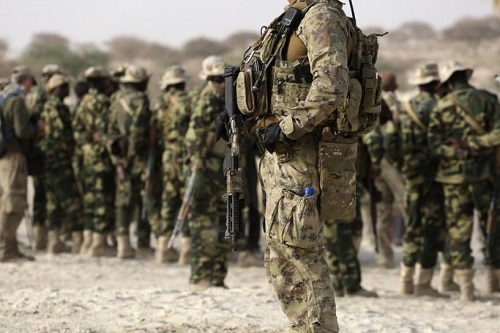Reuters photo
By
Ricardo Swire
As superpowers battle for global supremacy the US Military has increased overseas deployments in Africa. In recent times American Army entities have developed a complex logistics network on the African continent. AFRICOM reports state America has “a small footprint” on the ground. Patterns show that more than ninety percent of Africa’s fifty-four nations host either US military construction, advisory and security collaborations, or training missions.
US Africa Command’s most senior officer equates the American military presence to three thousand five hundred local exercises, programs and engagement annually, nearly ten US military operations conducted on the African continent daily, approximately six thousand US troops function across Africa, eight hundred in Niger. On Wednesday October 4th 2017 a fatal scenario showcased American military presence in Africa. Five Nigerien soldiers and three American Special Forces operatives were killed, two wounded. The multinational military team was ambushed one hundred and twenty miles north of Niamey Niger’s capital.
The Team comprised of twelve US Army Special Forces trainers and more than twenty Niger Armed Forces personnel were participants in a Reconnaissance Patrol and training operation on the border between Niger and Mali. Reports suggest the Unit was redeployed to support an active counterterrorism search for one of Al-Qaeda’s senior militants. The Unit was ambushed near Tongo Tongo village in Niger. In the recent past militant Jihadists launched cross-border attacks on refugee camps and Niger Armed Forces stations in the Tillaberi district. During mid-June 2017 Nigerien soldiers launched counter-offensives in the destabilized region.
The Pentagon’s Africa Command reported American soldiers were providing “advice and assistance to Nigerien security force counter-terror operations” when they came under fire. The shootout with Al-Qaeda militants travelling aboard “Technicals,” or pickup trucks mounted with fifty-caliber machine guns, lasted approximately twenty minutes. Two members of the third Special Forces Group were wounded, one Nigerien soldier killed. More than two dozen US Army Special Forces provide training and assist Niger’s Military Intelligence gathering. Reports pinpointed American drones on aerial patrol in the zone at the same time without participation.
Since 2013 US “Unmanned Aircrafts” have launched from a secret airfield in Niamey, Niger. US assistance with a US$50 million joint French/US drone headquarters in Agadez, Niger demonstrates America’s commitment to supporting French military operations in Mali, the high-tech facility coordinating drone transmissions and intelligence. The Base facilitates “Reaper Surveillance Drone” flights closer to southern Libya. It provides aerial monitoring of Islamic State insurgents in the south and movements north from the Sahel region.
After Gaddafi’s 2011 demise in Libya nomadic Tuareg fighters returned home to Mali and started the country’s destabilization. A US trained Malian Military Officer later overthrew Mali’s government to aggressively oppose the Tuaregs. However Islamic State militants forced both Tuareg and coup leader to retreat. America subsequently supported French and combined African Forces to recapture Mali. In the process of solidarity with French counterterrorism efforts in Mali the US Military is policing itself.
On Sunday June 4th 2017 an Army Green Beret was strangled while on assignment in Mali. The thirty-four year old Staff Sergeant’s body was found inside the US Embassy’s housing unit. The Green Beret shared the quarters, located in Mali’s capital Bamako, with other Special Operations counterparts. His autopsy report ruled death by strangulation. Two Navy Seal Team 6 members are under probe by the Army’s Criminal Investigations Command and the Navy Criminal Investigations Service (NCIS). Both Seals, considered “Persons of Interest,” were flown out of Mali and placed on administrative leave.
Ricardo Swire
Ricardo Swire is the Principal Consultant at R-L-H Security Consultants & Business Support Services and writes on a number of important issues.



No Comments Yet!
You can be first to comment this post!